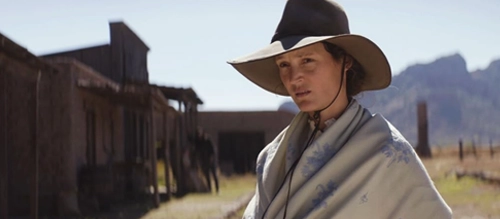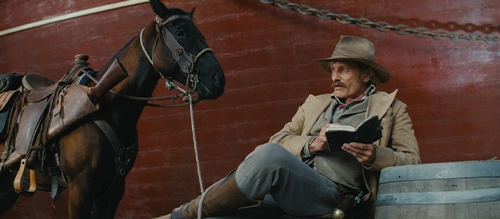
The Dead Don’t Hurt (2024)
Director: Viggo Mortensen
Screenwriters: Viggo Mortensen
Starring: Vicky Krieps, Viggo Mortensen, Solly McLeod, Garret Dillahunt, Danny Huston
It was 2022’s The Fabelmans that regaled the time Western pioneer, John Ford, sat a young Steven Spielberg down and stated “When the horizon’s at the bottom, it’s interesting. When the horizon’s at the top, it’s interesting. When the horizon’s in the middle, it’s boring as shit.” The sentiments of Ford’s pithy prose remain as potent and relevant now as they did when he first uttered them some 65 years ago, with Viggo Mortensen’s recent The Dead Don’t Hurt bearing the hallmarks of a film guided by Ford’s distinguished memory.
In his second directorial run-out after 2020’s Falling, Mortensen boldly reshuffles the deck while simultaneously staying true to the tropes that have made the Western genre what it is: weathered cinema that is tried, tested, and regularly proven. Predominantly shot on location in Mexico’s Durango, Mortensen and Danish cinematographer, Marcel Zyskind (As in Heaven and The Killer Inside Me), seamlessly capture the inexperienced filmmaker’s ambitious vision. Through the film’s wide lens, there is a distinct Fordian air, akin to The Searchers and 1939’s Stagecoach. Set against this rich backdrop of the sweeping planes of civil war-era San Francisco, the tale of Danish and French-Canadian immigrants Olsen (Mortensen) and Vivienne (Vicky Krieps) plays out in an organically unassuming manner.
Meeting on the San Franciscan docks, the pair’s slow-burning love affair sets sail after Vivienne, a fiery, self-assertive florist, unburdened by the conservative expectations on women of the time period, catches the gaze of the laconic, floppy-haired Olsen. Mortensen’s picture unfolds in a non-linear fashion, as we jump back, forth, and side-to-side, during, before, and after this modern couple meet and fall in love.
Settling outside a traditional mid-western town with its dusty saloon, menacing local gangsters, and under-the-thumb mayor, the pair construct a self-effacing yet wholesome life for themselves nestled in a nearby valley. Despite Vivienne’s initial protestations over the lack of evergreen nature around their secluded oasis, the pair take to frontier life swimmingly. Notably, Mortensen’s superbly written script doesn’t allow its audience or protagonists to stagnate in this idyllic equilibrium for too long as past troubles, future revelations, and present trauma collide head-on to create this interwoven collage of turbulence. Hop-scotching between flashbacks of Vivienne’s childhood and her personal battle with the film’s resident evil, sociopathic, Weston Jeffries (Solly McLeod), this woman of a steadfast disposition imbues this gravitating quality that also works as the glue that holds this puzzle together. While Vivienne’s inevitable death isn’t a spoiler due to its unveiling at the very start of the film, this knowledge adds a layer of poignancy and foreshadowing to everything Vivienne says and does throughout the film.

Despite Olsen’s progressive stance, he is the embodiment of a traditional man; quiet, contemplative, and governed by an inherent need to follow his moral conscience (ok, maybe not that traditional). Ostensibly a jack of all trades, and a seasoned army veteran, Olsen feels duty-bound to enlist in the imminent war-effort, joining up with the Union army and leaving his reluctant wife to tend to their happy homestead. This is a story as much about Vivienne’s radiance and devout commitment to her husband and son, as it is about Olsen’s requirement for virtuous fulfilment and, invariably, revenge.
The way The Dead Don’t Hurt deviates from Western conventionalism is through the manner in which it presents its principal characters, Olsen and Vivienne. Unremarkable in nature, they aren’t trigger-happy archetypes who are seemingly always in the right place at the right time like the Man with No Name and Josey Wales, or the self-righteous, shoot ‘em up hero that was Wyatt Earp. Instead, Mortensen opts for subtlety in his characters, and we learn more about Olsen and Vivienne’s journey, and their pursuit of the American Dream, in what goes unsaid; their perfectly married temperaments and mutual understanding, as demonstrated in a scene where the two of them attend Vivienne’s ex-fiancé’s art exhibition where this intertwined telepathy provokes this giggly reaction at the awkward absurdity of such a scenario.
Mortensen, who not only wrote, directed and starred in the film, but also composed its soundtrack, is stupendous as the gnarled Olsen, imbuing a natural chemistry with Vicky Krieps, who, like her co-star is in fine-fettle as the multi-dimensional Vivienne. In a genre historically lacking in heroine-input, Krieps’ rendition of Vivienne is refreshing, bearing similarities to Carey Mulligan’s Cassie in Promising Young Woman and Ada in Jane Campion’s The Piano. Her steely resolve and utter defiance in the face of the most horrific of circumstances doesn’t see her turn to vigilantism, cartwheeling in wielding a samurai sword, but rather more plainly, she faces down those who have wronged her, emphatically illustrating this unflinching tenacity. Mortensen and Krieps complement each other exceptionally, playing characters besotted with each other, yet never falling into the tiresome realms of cliché.
Even the bone-dry terrain of the Wild West requires a watering every once in a while in order to encourage signs of new life. There are short-lived periods where Mortensen’s screenplay feels ponderous and unnecessarily elongated, with the chronology a little hard to follow. Yet, despite the initial lack of narrative fluidity, the film does well at reestablishing a sense of order in its non-linear structure. The audience is only really tasked with reconfiguring its narrative surroundings once, which is testament to the creator’s storytelling credentials.
While it would be a stretch to label The Dead Don’t Hurt a feminist ode, this is a film that gives its lead woman a powerful voice, creating an unlikely yet inspiring hero in the process.
Score: 18/24
Written by Patrick Hayes

